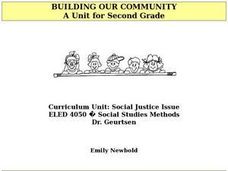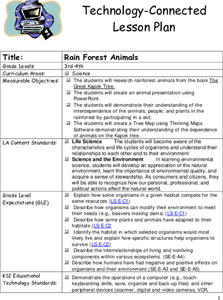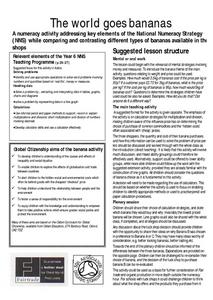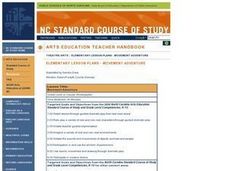Curated OER
Building Our Community
Second graders examine the different relationships within communities. They discover the need for rules and organization. They identify their role in the local community as well.
Curated OER
Getting To School: Loving It Or Loathe It?
Students engage in a study looking at the problem of transportation to school. They conduct research using a variety of resources. The information is used in order to work together to come up with possible solutions based upon current...
Curated OER
Ecology and the Conservation of Natural Resources
Young scholars examine the habits of various organism and evaluate the need for conserving natural resources. They role-play as migrating birds traveling between habitats encountering hazards along the way. They observe animals in a...
Curated OER
And the Rains Came Down: A South American Rainforest
Students examine the characteristics of a South American tropical rainforest. They analyze maps, develop graphs, listen to the book, The Great Kapok Tree, and create a rainforest mural.
Curated OER
Rain Forest Animals
Pupils research rainforest animals from the book The Great Kapok Tree. They create an animal presentation using PowerPoint. Pupils demonstrate their comprehension of the interdependence of the animals, people, and plants in the...
Curated OER
First Nation People and European Explorers
Sixth graders investigate the characteristics of explorers. They research the factors that contributed to the first European explorers that came to North America. Students also concentrate on the interactions that explorers had with...
Curated OER
Microorganism Multiplication
Sixth graders explore biology by viewing video clips in class. For this microorganism identification lesson, 6th graders identify the types of organisms that can feed small animals such as algae and protozoans. Students view video clips...
Curated OER
Population Dynamics
Students discover how organisms are dependent on one another for survivial. They also discuss how to conserve natural resources. They compare and contrast the different types of symbiotic relationships as well.
Curated OER
Character Building from Inside Out
Students determine how a stop animation movie is created. They compare the similarities of a stop animation movie to a flip book and construct a flip book showing fluid motion. They examine the different theories about why when a series...
Curated OER
Car Adverts: Tell It Like It is
Young scholars explore the strategies and bias that are sometimes used in advertising with a particular focus on automobile advertising. Working in groups, they read several car ads and discuss the bias, opinion and stereotyping in the...
Curated OER
Exploring Living Science Careers
Students explore a variety of agricultural careers that are available and look into them in terms of the economics and suitability to their interests. In this agriculture careers lesson students research the agriculture careers and...
Curated OER
Conservation 'Ad'vice for National Parks
Learners discuss ways that the public can damage as well as preserve our natural and cultural resources. Small groups are each assigned one of the national parks and must design a poster or TV commercial that celebrates the importance of...
Curated OER
Problems in Pollutia
Fifth graders, in groups, pretend as if they live in the imaginary kingdom called Pollutia. They make recommendations about environmental issues and give short speechs on how each problem should be solved.
Curated OER
From the Flintstones to the Jetsons
Eighth graders compare and contrast transportation and agricultural methods in the United States from Colonization to Reconstruction. They, in groups, create and present Ohio Memory Scrapbooks to rest of class.
Curated OER
New World, Old Evils: Latin America and the Holocaust
Students examine how Latin America was affected by the Holocaust in Europe. In groups, they research topics related to Latin America and World War II. They interview survivors if possible and discover how entire nations were effected...
Curated OER
The Issues-Substance not Style
Students continue to develop criteria for evaluating candidates, consider personal qualities needed in the presidency, and compare candidate's qualifications for office. They write in their journals: "What issues get the most air time or...
Curated OER
Looking At Science And Technology From a Human Rights Perspective
Young scholars answer discussion questions and analyze technological innovations, scientific discoveries, and environmental crises from a human rights perspective. They research and report back to the class about a related topic.
Curated OER
Introducing Psychology
Students investigate the concept of observable behavior. They watch someone for three to five minutes and record everything that is seen. Students must be as objective as possible, avoid any value judgments about physical appearance or...
Curated OER
I Was Hungry
Students engage in a lesson that focuses on the problem of hunger in the world. They are presented with the concept of being a global citizen. The context of the lesson is the reading of poetry and focusing on the statement "I was...
Curated OER
The World Goes Bananas
Learners comprehend the causes and effects of inequality and social injustice. They explore the effects of globalization and trade between countries. Students discuss the hidden social and environmental costs which often lie behind goods...
Curated OER
What Should I Recycle?
First graders discuss a plan to minimize waste. In this waste management lesson, 1st graders read "Why Should I Recycle," by Jen Green and create a classroom recycling plan.
Curated OER
Owning a Dog: Reading Comprehension
In this reading comprehension instructional activity, students read the five paragraph essay about the effects of children owning a dog. Then they answer 10 questions to indicate comprehension of the selection.
Curated OER
Lesson 2: The Story of Flagstaff
Students, in groups, write and perform a skit that retells the story of the flooding of Flagstaff.
Curated OER
Movement Adventure
Students discover movement and pantomime techniques in this adventurous story telling experience for kindergarten. Assessment is done through a short question and answer session and students drawing the "adventure".

























